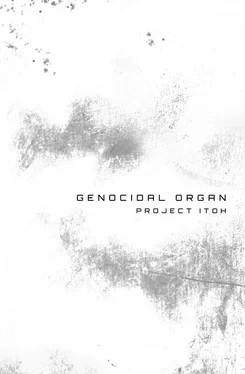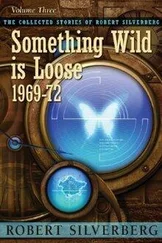Project Itoh - Genocidal Organ
Здесь есть возможность читать онлайн «Project Itoh - Genocidal Organ» весь текст электронной книги совершенно бесплатно (целиком полную версию без сокращений). В некоторых случаях можно слушать аудио, скачать через торрент в формате fb2 и присутствует краткое содержание. Год выпуска: 2012, ISBN: 2012, Издательство: Haikasoru/VIZ Media, Жанр: Старинная литература, на английском языке. Описание произведения, (предисловие) а так же отзывы посетителей доступны на портале библиотеки ЛибКат.
- Название:Genocidal Organ
- Автор:
- Издательство:Haikasoru/VIZ Media
- Жанр:
- Год:2012
- ISBN:9781421550886
- Рейтинг книги:4 / 5. Голосов: 1
-
Избранное:Добавить в избранное
- Отзывы:
-
Ваша оценка:
- 80
- 1
- 2
- 3
- 4
- 5
Genocidal Organ: краткое содержание, описание и аннотация
Предлагаем к чтению аннотацию, описание, краткое содержание или предисловие (зависит от того, что написал сам автор книги «Genocidal Organ»). Если вы не нашли необходимую информацию о книге — напишите в комментариях, мы постараемся отыскать её.
Genocidal Organ — читать онлайн бесплатно полную книгу (весь текст) целиком
Ниже представлен текст книги, разбитый по страницам. Система сохранения места последней прочитанной страницы, позволяет с удобством читать онлайн бесплатно книгу «Genocidal Organ», без необходимости каждый раз заново искать на чём Вы остановились. Поставьте закладку, и сможете в любой момент перейти на страницу, на которой закончили чтение.
Интервал:
Закладка:
In other words, neither scenario was particularly likely.
I’m nobody.
The young man had said these words repeatedly through his tears. He hadn’t exactly been crying because he was being forced to talk, of course—it was my well-placed shot to his kidneys that brought forth those tears. But that didn’t necessarily make the words that he managed to force out over his sobs any less true.
How, though? Shadowy figures able to manipulate the contents of the database at will? After all, “Mr. Bishop,” my assumed identity for this mission, was obviously a fiction. But this was only possible because I was a government agent and because the army had farmed out its own ID systems to an independent contractor rather than one of the standard civilian insurance companies. Even then, there were still lots of hoops for us to jump through, as with any country with a properly developed ID management system; every time the CIA or Special Forces needed a fake identity for one of their agents, they needed to secure explicit permission in advance. The chairman of the Senate Committee on Information Security and at least one other member of the committee needed to sign off on every request.
In other words, it was highly likely that the youth was some sort of government agent.
Which country could be acting on behalf of John Paul? Maybe that was the reason why the Pentagon was so keen on expediting John Paul’s elimination—because some other country was now getting involved?
“Yeah, that’s a possibility. He’s quite the little internationalist, isn’t he, this John Paul?” Williams nodded. So maybe we were being tailed not by John Paul, but by some foreign government agency that thought that we were somehow involved with him? That would fit: we had suddenly appeared out of nowhere and started spending a lot of time with Lucia Sukrova after all.
Damn. Secret agents from another country sure would put a monkey wrench in the works. The mood in the room darkened.
Anyhow, all of this was just guesswork and speculation. No point in fretting over the hypotheticals. What we had to do now was narrow down the possibilities. This was exactly what we had touched on in my conversation with Lucia: it was the act of narrowing down the possibilities, making logical predictions based on this information, and then surviving , that acted as the catalyst for the development of language and the ego. But spend too much time obsessing over the endless possible variations and you ended up missing your chance to actually do something.
And that’s why I decided to stop thinking too hard and focus on the facts that were in front of us.
Our character profile of John Paul was at best like a partially completed crossword puzzle, filling in the blanks one at a time but with the final few entries remaining tantalizingly out of reach. When he was our secondary target on our mission two years ago we had very few blanks filled in. Each mission since then had helped us to fill in some more of the blanks. Now we were almost there.
Conventional wisdom was that this was a terrible way to gather intelligence. As a basic military strategy, starting off with an insufficient force to achieve your objectives and then gradually increasing your resource allocation trickle by trickle as the war goes on was more or less the textbook way of how not to fight a war. As a tactic, it showed that you severely underestimated your opposition in the planning stages and wasted a significant amount of resources, time, and opportunity at the early stages of your campaign.
For Intelligence, information was power. It was our only real military resource. For regular forces, information was there to support the battle on the front lines, but to us in Intelligence information was our lifeblood, as powerful as live ammunition, as vital as a supply train. That was why we couldn’t understand, couldn’t stand, the indecisive, secretive attitude of the top brass over this mission. Trickling the information down piece by piece was just as stupid a strategy as slowly increasing your resource allocation bit by bit until you had enough of an edge to win. If only they’d just let us know all the facts up front, we wouldn’t be in this mess right now. On this point, at least, Williams and I were in agreement.
John Paul lost his wife and only child at Sarajevo.
John Paul’s wife and daughter, soon to turn six years old, were seeing the sights when they both vanished in a flash of fire as the city around them was turned into a giant crater. The beautiful city, its inhabitants, and a large number of visitors and tourists were all vaporized and scattered into the atmosphere along with copious quantities of radioactive debris. A mushroom cloud rose above Europe, marking the end of the post-Hiroshima era.
According to an ID trace, John Paul was in the apartment of a certain college student, one Lucia Sukrova, when the bomb detonated. Of course, I wouldn’t have known any of this or been allowed to learn of his private life unless it was strictly related to military and Intelligence business. I had no particular feelings about John Paul’s actual affair and made no judgment about his adultery. But I was trained to feel his pain, vividly. He betrayed them —the guilt, the pain, the self-recrimination and self-flagellation. All these feelings I could empathize with in abundance. It was my job.
A month after the explosion, John Paul had traveled to the camp near the perimeter of what was now called the Sarajevo Crater. Surrounded by NATO troops and an international task force there to guard the perimeter, John Paul waited in silence, patiently, for his turn to be loaned a protective suit to guard him from the nuclear radiation permeating the air of the ruins of Sarajevo. There were so many victims who had “disappeared” that it was impossible to tell with any degree of certainty who had gone missing and who was dead. At the time, genetic markers weren’t in widespread use as personal identification measures, so even when remains were discovered, it was rare that they could be identified as belonging to an individual. Most ended up in a mass grave.
Three weeks later, John Paul stood on the edge of the Sarajevo Crater, looking down into the abyss. There was no way to tell what this man who had lost his wife and daughter was thinking at that moment, but it was my job to try and imagine it.
And yet, I thought, what could a man possibly be thinking when confronted with the desolate landscape so typical of his favorite SF novels? When looking at the place that only a short while ago was a city but now had been scorched into a smooth, glassy wasteland surrounding a giant crater? What would the white-radiation-suit-clad figure think as he stood on the edge, looking down at the giant mortar bowl, imagining his family being crushed into paste?
Shortly after he returned home, John Paul dropped out of MIT and shut himself away for six months. He ordered his groceries online. For half a year there was not a single record of him ever having used the subway, a bus, a tollbooth, a shopping mall, or a store. His web receipts showed that the only purchases he ever made online were for food. John Paul isolated himself from the world as much as was physically possible.
What depths of despair had John Paul been cultivating during these six months? Did he make attempts on his own life? Was every night a sleepless one? And then, emerging from his self-imposed silence, John Paul suddenly decided to take a job at a prestigious PR firm. A firm that regularly worked for governments and big business, coordinating “hearts and minds” propaganda campaigns. At the time John Paul joined the company his new employers were being retained by a certain developing country in an effort to persuade the international community that said country was an excellent prospect for direct foreign investment.
Читать дальшеИнтервал:
Закладка:
Похожие книги на «Genocidal Organ»
Представляем Вашему вниманию похожие книги на «Genocidal Organ» списком для выбора. Мы отобрали схожую по названию и смыслу литературу в надежде предоставить читателям больше вариантов отыскать новые, интересные, ещё непрочитанные произведения.
Обсуждение, отзывы о книге «Genocidal Organ» и просто собственные мнения читателей. Оставьте ваши комментарии, напишите, что Вы думаете о произведении, его смысле или главных героях. Укажите что конкретно понравилось, а что нет, и почему Вы так считаете.












